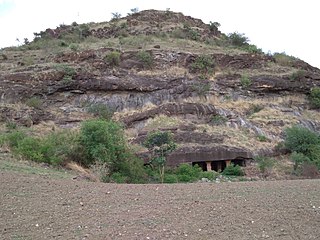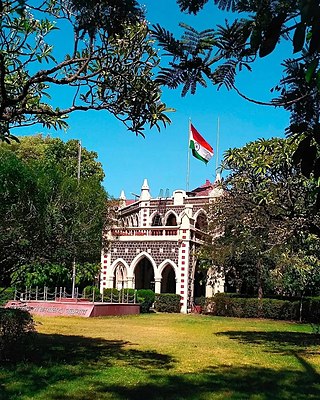
Jalna district is an administrative district in the state of Maharashtra in western India. Jalna town is the district headquarters. The district is part of Aurangabad division.

Jalgaon district is a district in Maharashtra, India. Its headquarters is the Jalgaon city.
Mangalwedha is a town in the Solapur district in the Indian state of Maharashtra. It is the birthplace of Shri Jayatirtha, also called Teekacharya, one of the prominent saints of the Dvaita school of Vedanta.
Alibag taluka is a subdistrict/upazila/tehsil in Raigad district of the Indian state of Maharashtra.
Wayanad Jeerakasala rice is a variety of traditional, non-Basmati, medium-grained aromatic rice with golden yellow colour mainly grown in the Indian state of Kerala. It is a common and widely cultivated crop in Wayanad district. The other variety from the same region, Wayanad Gandhakasala rice is known for its sandalwood-like flavor, while Wayanad Jeerakasala rice resembles cumin seeds in both appearance and taste and are so unique from one another.
The 'Marathwada Kesar mango', is a mango cultivar primarily grown in Marathwada region of Maharashtra, India. Districts where they are primarily grown are Chhatrapati Sambhaji Nagar, Jalna, Beed and Latur.
The Nandurbar Mirchi is a variety of chilli grown in the Indian state of Maharashtra. It is mainly cultivated in Nandurbar & Dhule districts of Maharashtra.
Ajara Ghansal is a variety of non-Basmati aromatic rice mainly grown in the Indian state of Maharashtra. It is a common and widely cultivated crop in Ajara taluka of Kolhapur district.
Bhandara Chinoor rice is a variety of non-Basmati aromatic rice mainly grown in the Indian state of Maharashtra. It is a common and widely cultivated crop in talukas of Bhandara, Pauni, Tumsar, Mohadi, Sakoli, Lakhani, and Lakhandur of Bhandara district.
Marcha rice is a variety of non-Basmati, short-grained aromatic rice mainly grown in the Indian state of Bihar. It is a common and widely cultivated crop in Ramnagar, Gaunaha, Mainatand, Chanpatiya, Narkatiyaganj and Lauriya blocks of West Champaran district.
Adamchini Chawal is a variety of non-Basmati, traditional, short-grained aromatic rice mainly grown in the Indian state of Uttar Pradesh. It is a common and widely cultivated crop in Chandauli, Mirzapur, Varanasi and Sonebhadra, and Vindhya region of Eastern Uttar Pradesh.

Jalgaon Bharit Brinjal is a variety of brinjal grown in the Indian state of Maharashtra. It is a common and widely cultivated crop in areas like Asoda, Bamnod, Mamurabad, Bhadli, Bhalod and Bhusaval of Jalgaon district located in the Khandesh region of North Maharashtra.
Lasalgaon onion is a variety of red onion grown in the Indian state of Maharashtra. It is a common and widely cultivated crop in Lasalgaon located in the Niphad taluka of the Nashik district. Lasalgaon has the largest onion market in India and the Asian continent. Significantly, the Lasalgaon onion market rate serves as a benchmark, influencing onion prices across the Asian market.
Alibag White onion is a traditional variety of white onion grown in the Indian state of Maharashtra. It is a common and widely cultivated crop in the Alibag taluka of the Raigad district. This onion is characterized by its sweetness, low pungency, and high nutritional value. It is traditionally cultivated in Alibag, specifically in villages such as Karle, Khandala, Nevuli, Talvali, Sagaon, and Wadgaon. It has been recognized since 1883 in the official gazette and known for its medicinal properties, for its health benefits, including treating heart ailments, controlling cholesterol, and regulating insulin.
Jalgaon banana is a variety of banana grown in the Indian state of Maharashtra. It is a common and widely cultivated crop in Jalgaon district located in the Khandesh region of North Maharashtra. Under its Geographical Indication tag, it is referred to as "Jalgaon Banana".
Myndoli banana is a variety of banana grown in the Indian state of Goa. It is a common and widely cultivated crop in the villages of Pernem, Bicholim, and Bardez Taluka in North Goa district. Myndoli bananas are distinct due to their long, tusk-shaped appearance and larger size, setting them apart from other banana varieties in Goa. Under its Geographical Indication tag, it is referred to as "Myndoli Banana".
Waigaon Turmeric is a variety of Turmeric mainly grown in the Indian state of Maharashtra. It is a common and widely cultivated crop in the village of Waigaon located in Samudrapur taluka of Wardha district. It is also grown in other villages of Samudrapur taluka, including Muradpur, Pawangaon, Mangrul, and Dongargaon.
Sangli turmeric is a variety of turmeric mainly grown in the Indian state of Maharashtra. It is a common and widely cultivated crop in Sangli district. Turmeric cultivation is prominent in the southern region of Sangli, specifically in the areas of Miraj, Tasgaon, Palus, Kadegaon, Walwa, Vita, Khanapur, and Chinchali. Sangli accounts for nearly 70 per cent of the state’s total production and stands as the premier trading hub for turmeric in Asia, and possibly globally. The district has garnered the nickname "Saffron City" due to its strong association with turmeric.
Vasmat Haldi is a variety of turmeric mainly grown in the Indian state of Maharashtra. It is a common and widely cultivated crop in Hingoli district of the Marathwada region of Maharashtra. Turmeric cultivation is prominent in the districts of Hingoli, Parbhani, Nanded, Washim and Akola. Hingoli district has the largest area under turmeric cultivation in this region.
Mangalwedha jowar is a variety of sorghum cultivated in the Indian state of Maharashtra. Maldandi jowar is traditional variety of grain and widely cultivated crop in the Mangalwedha taluka of Solapur district. ICRISAT developed several new varieties by incorporating genes from the Mangalwedha Maldandi (M-35-1) strain.


